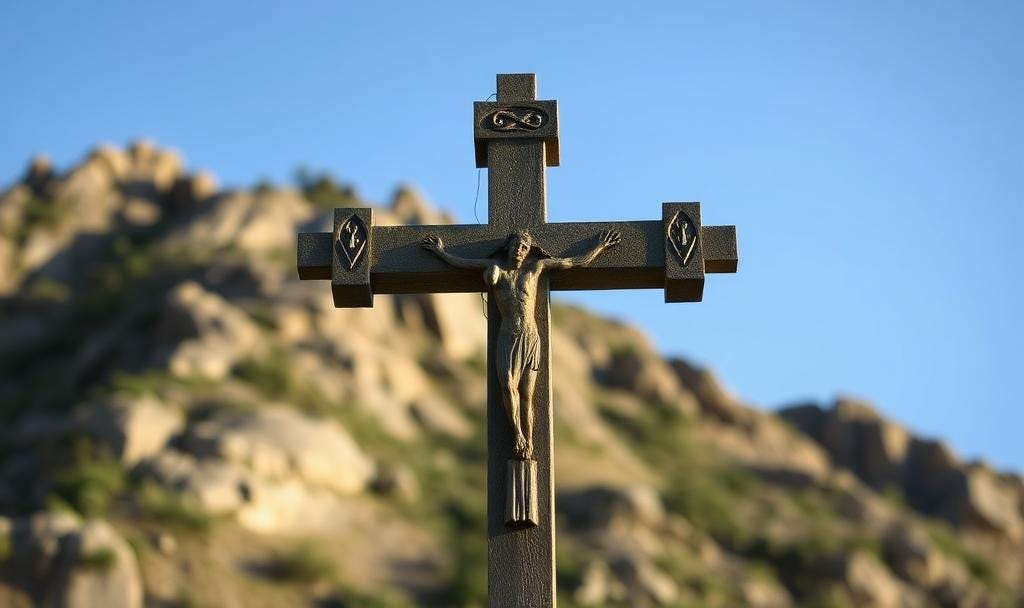As discussed in the last post, suffering is a tragic part of the human experience. It is a reality that we all must face. It is uniquely human. All animals can feel pain, but only we can suffer. As John Paul II points out in Salvifici Doloris,
“Nevertheless what we express by the word “suffering” seems to be particularly essential to the nature of man. It is as deep as man himself, precisely because it manifests in its own way that depth which is proper to man, and in its own way surpasses it. Suffering seems to belong to man’s transcendence: it is one of those points in which man is in a certain sense “destined” to go beyond himself, and he is called to this in a mysterious way.”
Suffering is not merely the experience of pain. It is an awareness of a deficiency. The man who suffers does not suffer merely because of the pain, but because that pain is a reminder of what is lacking in himself and in the world. Suffering arises from the experience we all have of looking at ourselves and the world, and thinking “it should not be this way”.
So, what are we to do with the fact of suffering? Many have tried to run from it in the pleasures and comforts of the world only to find that these things are vanities. Ultimately, we are left with two options to deal with suffering. There is the Way of Mephistopheles, or the Way of the Cross. A middle ground does not exist. Everyone suffers, there is no choice in the matter. However, each person can choose how they will respond to it.
Suffering and Resentment
The Way of Mephistopheles, is named after the demon in Faust, and his line: “for all that comes to be / deserves to perish wretchedly”. This response is characterized by its bitter resentment. This resentment fills a person with rage, and is a quick path to misery. And, as they say, misery loves company. Those who suffer may become envious of those they perceive as suffering less. This envy, prodded by their resentment and misery, forms the basis of the justification to inflict suffering on others. Not so that they may suffer less, but so that all will suffer as they do and “perish wretchedly”. While this is certainly a grim outlook, we would be foolish to deny that our own hearts do not have the capacity for this kind of resentment. We have all seen it in small forms, like losing our cool with a family member because we are having a bad day, or maybe even in larger forms like celebrating murder. This approach to suffering ruins lives and relationships. Despite what our culture says about the compassion behind abortion and euthanasia, it is this view of suffering that drives these things. Abortion pits a mother against her child, and justifies the evil done to the child in light of the suffering or potential suffering of the mother. And with respect to euthanasia, in Canada for example, it did not take long before assisted suicide was offered to those who are suffering and did not ask for it. The contempt for suffering can drive us towards moral abominations. Indeed, in the final analysis, there may be no real difference between resentment towards suffering and resentment towards those who are suffering.

The Death of Suffering
Now that we have seen the bitterness of the Way of Mephistopheles, let’s take a look at the Way of the Cross. The path is characterized by the acceptance of suffering. Rather paradoxically, this is the only path out of suffering. Any athlete or musician knows this. In order to be excellent at something, one must suffer through long and grueling hours of practice. However, once a sort of excellence is achieved, the suffering decreases even if the practice is just as long and grueling. The symbol of the cross itself shows us the truth of this paradox. The cross has gone from a symbol of suffering so severe that it struck fear into the heart of every Roman to a symbol of hope for untold numbers of people throughout history, and all because of Jesus’ willingness to accept suffering. In the end, the problem of suffering cannot be solved without Jesus. Yes, as is laid out in this article, there is good reason to take the Way of the Cross without an explicit appeal to religion, but suffering itself cannot die unless we are willing to unite ourselves with Christ and accept the will of God the way He did in Gethsemane. As St. Paul explains in Philippians 3, by sharing in the sufferings of Christ, we can also share in his resurrection. When we learn to fully accept God’s will, suffering becomes a gift. There is no longer a reason to say, “it should not be this way”. Suffering takes on a whole new character. It becomes redemptive. Perhaps the truth of suffering is that it is destined to become either the means of our salvation or of our eternal ruin.


